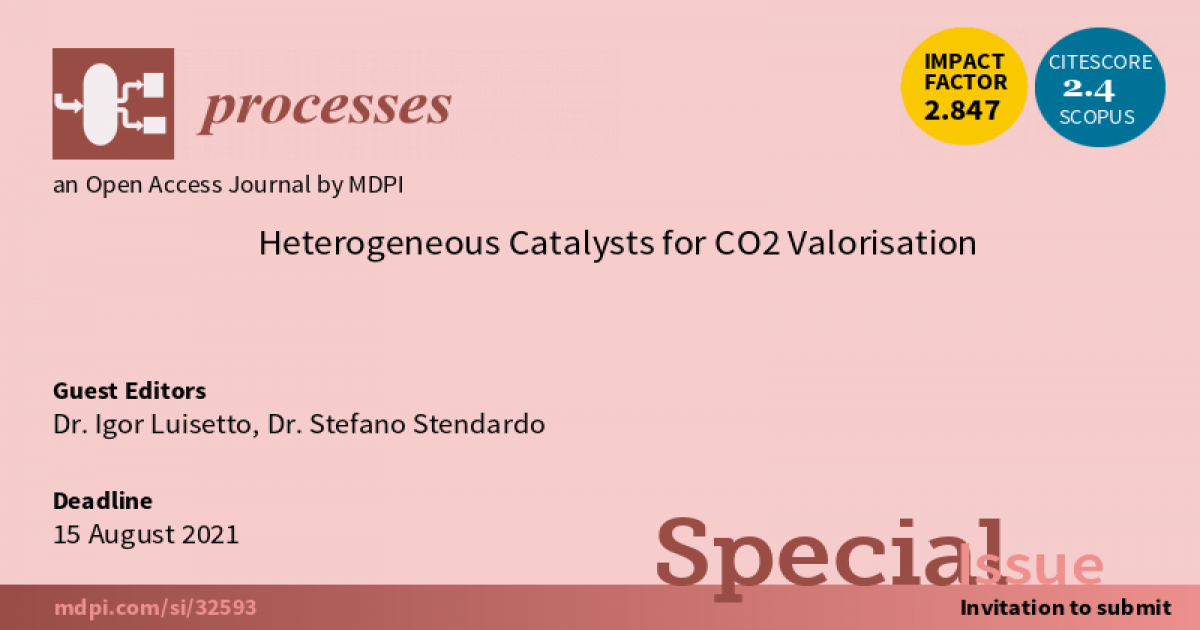Heterogeneous Catalysts for CO2 Valorisation
A special issue of Processes (ISSN 2227-9717). This special issue belongs to the section "Catalysis Enhanced Processes".
Deadline for manuscript submissions: closed (15 August 2021) | Viewed by 13836

Special Issue Editors
Interests: gas–solid reaction; CO2 capture and valorization; multiphase modeling; sustainable technologies
Special Issues, Collections and Topics in MDPI journals
Interests: gas–solid reaction; CO2 capture and valorization; multiphase modeling; sustainable technologies
Special Issue Information
Dear Colleagues,
The emission of CO2 from anthropogenic activities is responsible for the greenhouse effect. CO2 is mainly emitted by the use of fossil fuels for energy production and by some types of energy-intensive industries such as cement, iron, and steel. The greenhouse effect is recognized as the main factor of the ongoing climate change and will have a negative impact on the environment and global economy if not adequately reduced (Paris Climate Summit, 21st Conference of Parties). The decarbonization of production and energy-related processes and the valorization of CO2, to produce chemical compounds with high added value, are keys challenge to achieve this purpose, leading to a sustainable carbon cycle. Today, several processes for CO2 valorization are available or under development, including the CO2 splitting to CO and O2; the hydrogenation of CO2 to methane or to liquid hydrocarbons, to store energy excess from industrial wastes and/or nonprogrammable renewable sources in well-designed gas infrastructure; the reaction of CO2 with CH4, called dry reforming; and the high temperature co-electrolysis of CO2 with H2O or the artificial photosynthesis. However, the CO2 molecule is thermodynamically stable, and its activation requires the use of suitable heterogeneous catalysts and alternative sustainable processes. In this regard, there is a continuous effort to improve the performances of the catalysts and their durability through the study of all the fundamental aspects involved in the catalytic process.
This Special Issue covers the design, preparation, and characterization of novel heterogeneous catalysts, as well as new, advanced, and sustainable technologies, for CO2 valorization.
Dr. Igor Luisetto
Dr. Stefano Stendardo
Guest Editors
Manuscript Submission Information
Manuscripts should be submitted online at www.mdpi.com by registering and logging in to this website. Once you are registered, click here to go to the submission form. Manuscripts can be submitted until the deadline. All submissions that pass pre-check are peer-reviewed. Accepted papers will be published continuously in the journal (as soon as accepted) and will be listed together on the special issue website. Research articles, review articles as well as short communications are invited. For planned papers, a title and short abstract (about 250 words) can be sent to the Editorial Office for assessment.
Submitted manuscripts should not have been published previously, nor be under consideration for publication elsewhere (except conference proceedings papers). All manuscripts are thoroughly refereed through a single-blind peer-review process. A guide for authors and other relevant information for submission of manuscripts is available on the Instructions for Authors page. Processes is an international peer-reviewed open access semimonthly journal published by MDPI.
Please visit the Instructions for Authors page before submitting a manuscript. The Article Processing Charge (APC) for publication in this open access journal is 2400 CHF (Swiss Francs). Submitted papers should be well formatted and use good English. Authors may use MDPI's English editing service prior to publication or during author revisions.
Keywords
- CO2 valorization
- New catalytic process
- Carbon neutral fuels
- Heterogeneous catalysts
- Structure–activity relation
- Reaction mechanism
- Surface science
- Catalyst deactivation
Benefits of Publishing in a Special Issue
- Ease of navigation: Grouping papers by topic helps scholars navigate broad scope journals more efficiently.
- Greater discoverability: Special Issues support the reach and impact of scientific research. Articles in Special Issues are more discoverable and cited more frequently.
- Expansion of research network: Special Issues facilitate connections among authors, fostering scientific collaborations.
- External promotion: Articles in Special Issues are often promoted through the journal's social media, increasing their visibility.
- Reprint: MDPI Books provides the opportunity to republish successful Special Issues in book format, both online and in print.
Further information on MDPI's Special Issue policies can be found here.






